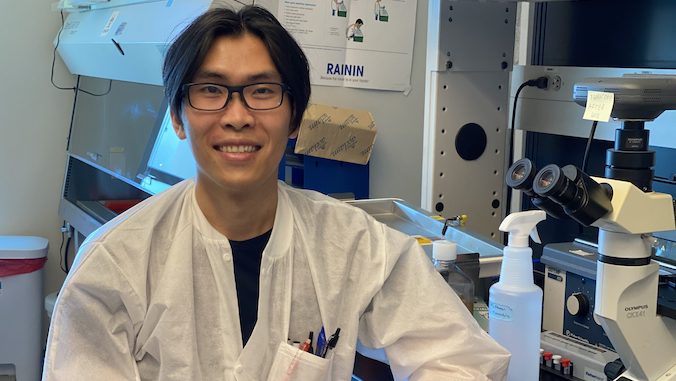
An international fellowship recently sent University of Hawaiʻi at Mānoa’s Albert To to Africa to research ways to help Liberia determine where insect-borne viruses are present. The John A. Burns School of Medicine (JABSOM) postdoctoral researcher received the 2022 Robert E. Shope International Fellowship from the American Society of Tropical Medicine and Hygiene. To will conduct research through May in Liberia’s most rural and remote areas.
To’s study will provide a glimpse of the circulating insect-borne viruses in the country, which has scarcely been documented.
His research there will supplement the work started by JABSOM Principal Investigators Vivek R. Nerurkar, chair, and Axel Lehrer, associate professor in the Department of Tropical Medicine, Medical Microbiology and Pharmacology. This is in collaboration with co-principal investigator, Peter Humphrey, at the University of Liberia (UL).
Building on existing research
Nerukar and Lehrerʻs existing project in Liberia looks at the epidemiology of Lassa virus and filoviruses, including Ebola, Marburg and Sudan ebolavirus, which recently swept through Uganda. To’s research will focus on the natural history of West Nile, Dengue, Usutu, Yellow Fever, Zika, Crimean-Congo Hemorrhagic Fever, Rift Valley Fever, O’nyong nyong and Chikungunya viruses.
“The staff at the UL are collecting human and animal samples to check their blood to see if they have any antibodies,” To said. “What the antibodies do is kind of give them a clue about the viruses circulating in that area or have circulated in that area.”
To will conduct a type of surveillance known as “seroepidemiology.” Using blood samples, seroepidemiology is a tool that allows scientists to determine previous exposure to certain viruses.
Study results to aid Liberian health officials
To will inform Liberian health officials of the results, which will allow them to target their outreach about specific viruses more strategically and precisely.
“The Liberians are appreciative of our efforts because there’s not much of this type of research going on,” To said. “There’s few people in Liberia that can do this research. They are actively developing their infrastructure and communication networks, so it’s helpful that we’ll be providing them with important information that they can use to come up with healthcare policies or even containment strategies.”
To’s Liberian trip will be another chapter in UH’s relationship with UL. Students from Liberia have enrolled at the JABSOM, and at the same time, the Department of Tropical Medicine, Medical Microbiology and Pharmacology continues to have a presence in the country on the West African coast.
With only one recipient selected each year, To said he is proud to put JABSOM on the map with this fellowship.
“The previous recipients of this award are from Stanford, MIT and Harvard. JABSOM is a smaller school, and tropical medicine is a small department, so it’s nice to show that we’re up there with those large, well-funded universities.”

